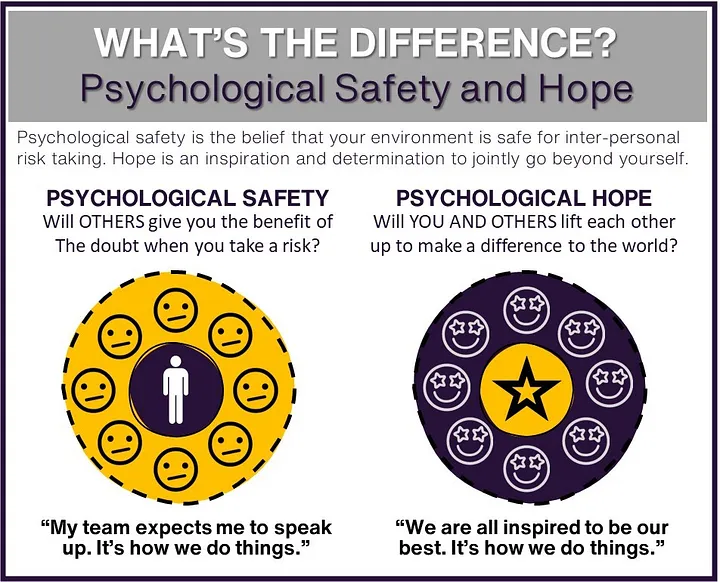

Author: Otti Vogt
Disruptive thinker, amateur poet and passionate global C-level transformation leader with over 20 years of experience in cross-cultural strategic change
WHY SHOULD YOU CARE?
Dive into the paradox of ‘Psychological Safety’: Uncover its rise from common sense to corporate craze. Beyond buzzwords, explore its implications, from fostering growth to the danger of overprotection. Discover the true essence of transformation, and why nurturing ‘Psychological Hope’ might be the key to unlocking collective inspiration and impact. An eye-opening perspective on workplace dynamics.
Taking a Leap Beyond the “Comfort zone”

Psychological Safety relates, roughly speaking, to the belief that we shouldn’t be punished or humiliated for speaking up with our ideas, questions, concerns, or mistakes.
Which, if you asked me, sounds pretty much common sense. Fancy name apart — why did everybody jump on it as if it was the hottest thing since the invention of bread? (To be fair — Amy Edmondson was equally surprised when it suddenly became an HR staple!)
We all know, you might quip, that common sense is terribly uncommon. So, this “new” concept made it finally legitimate for people (and HR) to call out rowdy behaviour in organisations. And its popularity proves that we still have lots of places where bad bosses behave like stone-age monkeys.
Good point! Only that I have a marginal suspicion that really nasty bosses would not care much about fancy academic concepts. Plus, in practice “psychological safety” seems to have often been used rather indiscriminately to mandate etiquette or political correctness — or to suddenly demand from employees to be more agile, engaged and vocal to generate new ideas and processes. All of which might be helpful in some cases, but in others could quickly become an undue exercise of “socialisation” power (Foucault, anyone?). And we already have enough linguistic violence in management that infantilises adult employees — like growth mindsets, empowerment, fail fast, human capital etc.
Yes, but that certainly wasn’t the intention, you will object. Here I agree. And I am certainly not advocating organisations that use or tolerate fear, where employees are not able to speak up or have to suffer undignified or disrespectful working practices.
Still… I cannot lose the feeling there is more. You know me. I always get nervous when “discourses” suddenly get dominant. I mean, just those words: “Psychological”. “Safety”. It is curious how the notion of “psychological” seems to acquire normative value. Why would something that is “psychologically observed” (i.e., an emotive or unconscious phenomenon) suddenly become a general rule for everybody? What if I claimed “psychological holidays”? The risk here is that the alleged normativity disguises its instrumentality: if happier cows give better milk, we must make them happy. If safer cows…
But what is it about “safety”? Why has the idea of “being safe” suddenly become sexy? Have we all become so terribly anxious in this “VUCA” (another nonsense term!) world that even the most “basic” promise of protection sounds exciting? Or, is it that safety — see Hobbes — is simply a cardinal expression of individual, negative freedom? Is psychological safety just another way of saying: the only thing that matters is me, my emotions, my thoughts, my desires and I have an absolute right to express them, whatever…? Who knows…
But I wanted to write about something else entirely. Often when HR consultants noisily call for more “psychological safety”, I sense they are approaching organisational transformation from the wrong angle. Let me explain:
Why do we have psychological risks in the workplace in the first place? Simple. Most of the risks exist, because organisations entail encounters between humans. So, why do we need safety? Easy. Beyond a need to sanction those truly abusive companies or bosses mentioned earlier (shame on them!), we want safety to challenge ideas, people or perspectives. Companies today need agility, collective learning and continual transformation.
But there is the problem. Growth, learning, and development are not simply about the absence of risk. They often require tension, conflict, and even crisis. Hence, in order to support individual and collective growth, we need to craft “holding environments” where people care and take accountability for each other. We need to offer “public places”, to collectively deliberate. Where personal needs, ideas, and desires are transformed into collective and shared needs, ideas, and desires — and where agents of such ideas are themselves transformed through their participation in the practice of community. More than eliminating risk, or offering immunity from emotional embarrassment or humiliation— what matters is mutual trust, inter-independence and collective responsibility for “lifting each other up”. Not to mention resources — don’t expect people to contribute if they have no real rights, or do not participate in the benefits!
As Amy shows herself (see below), maximising psychological safety “by itself” quickly ends up in a comfort zone.

In fact, demanding risk-free organisations misses the existential fact that all people have their own ways of being. We cannot deny this away, but must enable spaces to contain mutual exposure and build relational resilience and “political” maturity and reciprocity. This is not about compromising, but about transforming our inter-personal dialogic ability to co-develop with each other. If we focus human organising on the elimination of risks for the individual, and simply seek to “immunise” ourselves from the necessarily ambiguous exposure to each “other”, we might get more diverse “voices” in a meeting, but we won’t truly construct a space to co-develop — and there is a real chance that we miss out on much of the aliveness of organisations altogether.
This is where I have always found the notion of “radical candour” more interesting than “psychological safety” because it endorses accountability — the idea is that we provide constructive or radical feedback, “because we care” about each other’s growth. It is a reciprocate commitment to action, not just the absence of punishment or fear. However, I believe Kim Scott’s concept focuses too much on just improving organisational performance, and too little on personal and collective growth. And sometimes it is abused to legitimise bullying or harassment. So, I will suggest a move towards “virtuous friendships” that enable individual and collective flourishing…

In a nutshell, we must install those professional standards and shared norms, to enable mutual accountability; craft trusting social relations to enable personal development; and install what Aristotle called ‘koinonia’ — political community that works towards a common vision.
And herein lies the reality: true transformation is not a top-down installation of behavioural norms or the denial of risk — it is the slow, frustrating, difficult, and often unpopular change of individual and collective attitudes and behaviours. It is founded on the embracing of relational risks, rather than the avoidance of them.
True transformation is not a top-down installation of behavioural norms or the denial of risk — it is the slow, frustrating, difficult, and often unpopular change of individual and collective attitudes and behaviours.
Hence, the question might not be whether organisational spaces should be absolutely safe or not, but rather what kind of safety is desirable, and at which point our desire for safety becomes counter-productive. In the modern and sometimes superficial debate about “psychological safety” it often becomes a binary “either-or” question in which the opportunity to exercise judgment virtually disappears. But if we unconsciously reify an almost infantile denial of relational risk, and foster individual negative freedom at the cost of collective development — by quickly moving towards top-down rules, D&I programmes, or standards to eliminate alleged safety hazards — rather than inspiring a climate of care, instigating “liberating disciplines” and opening conversations about the “appropriate containing of the appropriate risks”, we might be missing a trick.
But, above all, and herein lies the relevance of those “professional” performance standards, true transformation is about embracing and embodying a deeper inspiration. A “professional tradition” connects our activity with a higher good, nurtures our desire to both do better and become better, and stimulates us to work and compete with each other for the good of the activity itself.
You want psychology? Then let’s call it “Psychological Hope” — an environment conducive and protective of mutual “co-elevation”. Rather than safety, we need to create relational and institutional contexts that spark deeper motivation and stimulate teams to care for each other in the desire to collectively inspire their specific tasks, projects or products, and to create meaningful impact for their own life and others…
The article originally appeared on Medium, republished with the permission of the author.
Written by: Otti Vogt
Employee Experience Future of Work psychological safety Strategy & Transformation
Previous post

- 2493
labelArticles today2023.08.08.
HR Transformation: A Blueprint for Organizational Excellence
WHY SHOULD YOU CARE? In an age of disruption, conventional HR approaches fall short. Enter Dave Ulrich’s paradigm-shifting strategies. This article deciphers Ulrich’s multi-stakeholder blueprint, guiding HR leaders through a [...]
Similar posts

labelArticles today2024.07.24.
AI-Powered HR: Strategic Benefits and Practical Applications

labelArticles today2024.06.24.









Post comments (0)